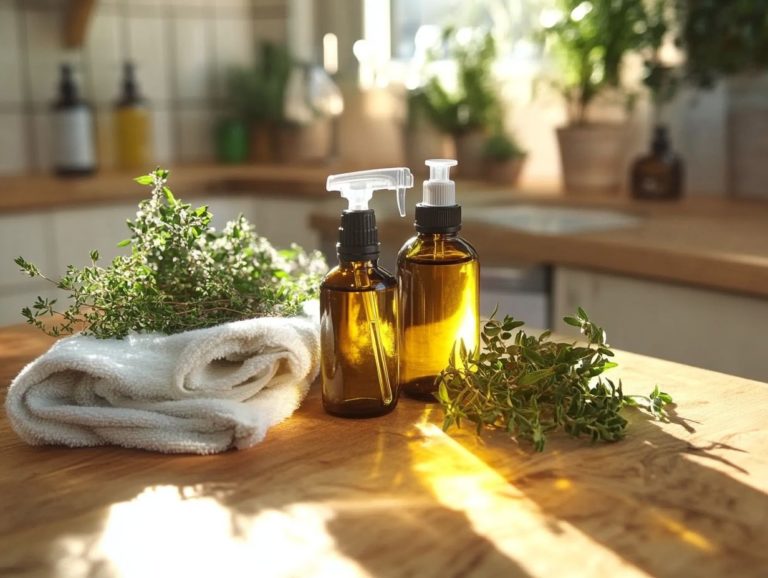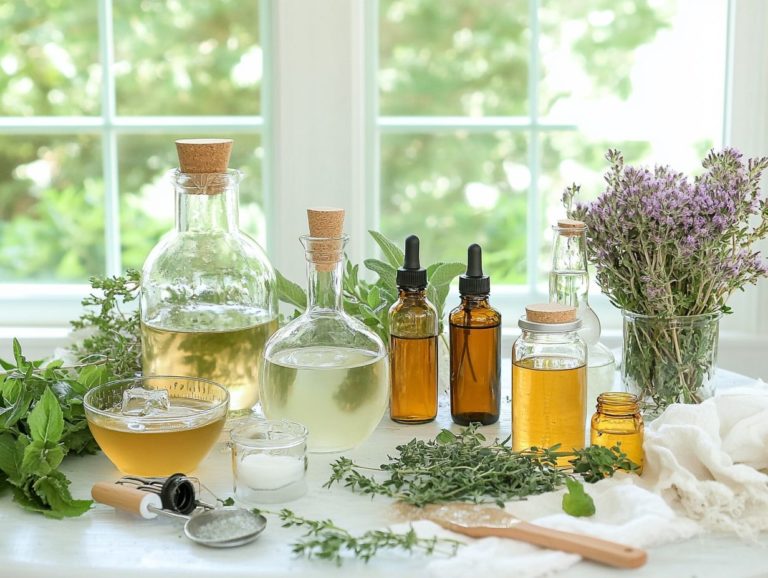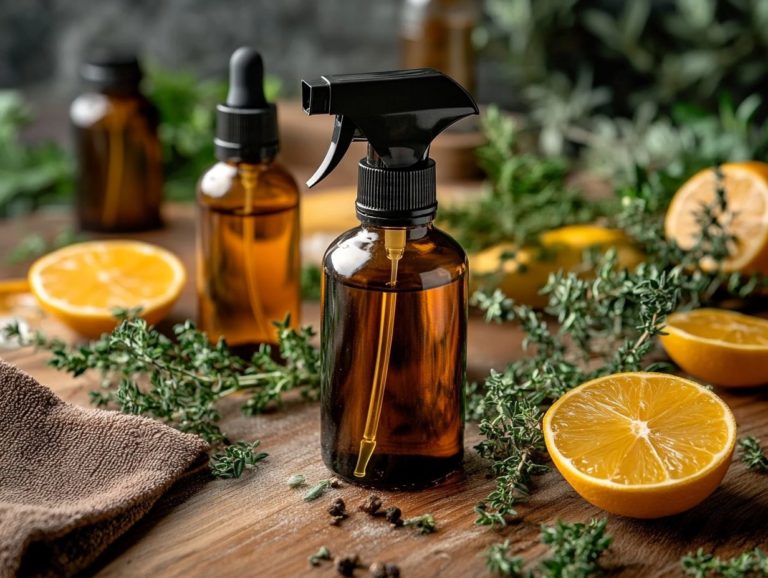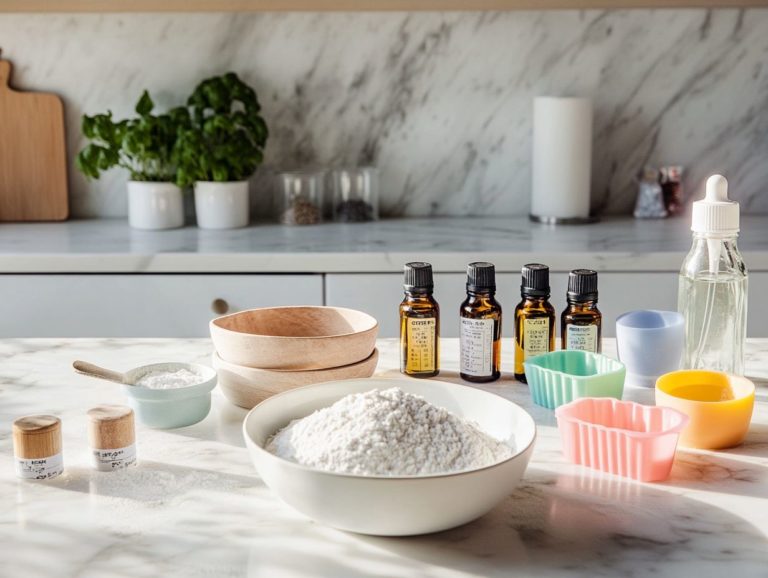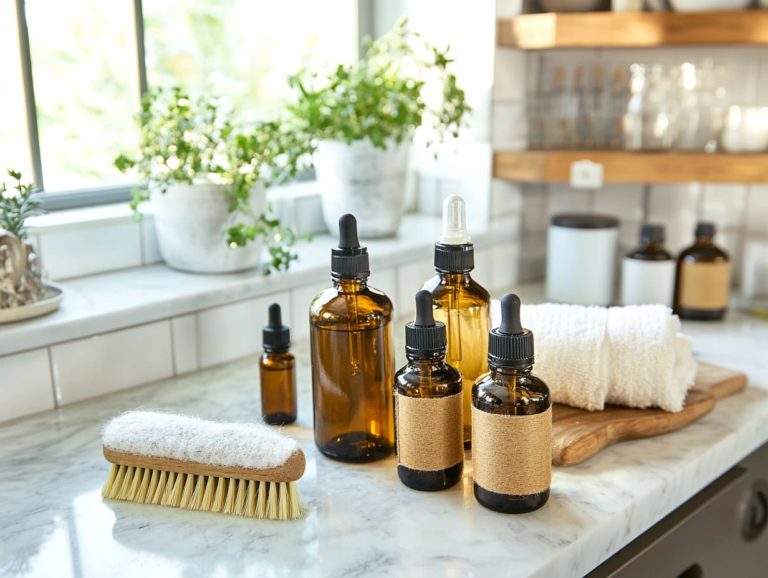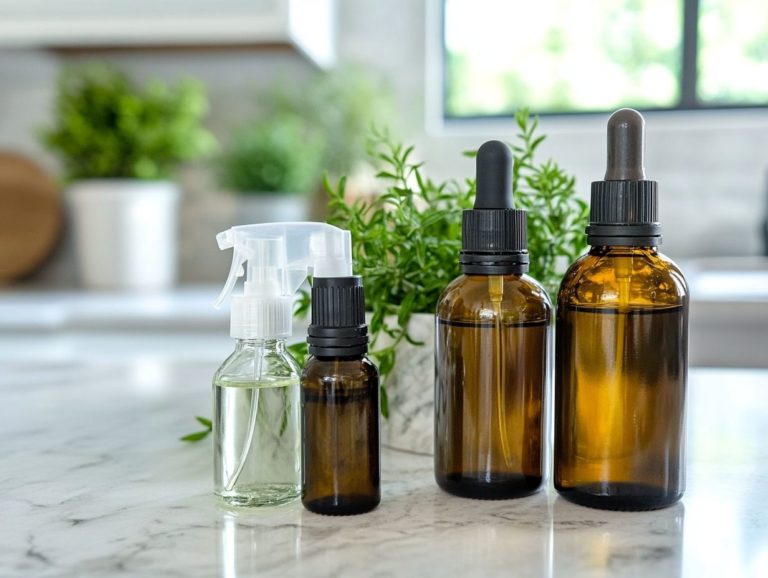5 Essential Oils to Eliminate Allergens at Home
Allergies, such as acute allergic rhinitis and seasonal allergies, can be an ongoing source of discomfort, yet nature provides you with remarkable allies in the battle against allergens.
Essential oils, celebrated for their therapeutic properties, serve as effective tools for alleviating allergy symptoms and cultivating a healthier home environment. These natural remedies can also aid in stress relief, improved sleep, and overall wellness.
Consider exploring five essential oils Peppermint, Lavender, Eucalyptus, Tea Tree, and Lemon that can assist you in combating allergens. Additionally, oils like Basil oil and Frankincense offer a range of therapeutic benefits.
You ll learn how these oils work, their benefits, usage tips, potential risks, and additional natural methods for maintaining an allergen-free home.
Uncover the secrets to harnessing the power of essential oils and enjoy a breath of fresh air in your living space!
Contents
- Key Takeaways:
- 1. Peppermint Oil for Digestive and Respiratory Support
- 2. Lavender Oil
- 3. Eucalyptus Oil
- 4. Tea Tree Oil for Skincare and Immune Support
- 5. Lemon Oil
- What Are Essential Oils and How Do They Work for Your Health?
- What Are the Benefits of Using Essential Oils for Allergies?
- Which Essential Oils Are Best for Allergies?
- How Can Essential Oils Be Used to Eliminate Allergens at Home?
- Are There Any Risks or Side Effects of Using Essential Oils for Allergies?
- What Other Natural Methods Can Help Eliminate Allergens at Home?
- Frequently Asked Questions
- What are the 6 essential oils that can eliminate allergens at home?
- How do eucalyptus essential oils help eliminate allergens?
- Can peppermint essential oil reduce allergy symptoms?
- Can lavender essential oil be used to eliminate dust mites?
- How can tea tree essential oil help with allergies?
- Is lemon essential oil effective in eliminating pet dander?
Key Takeaways:
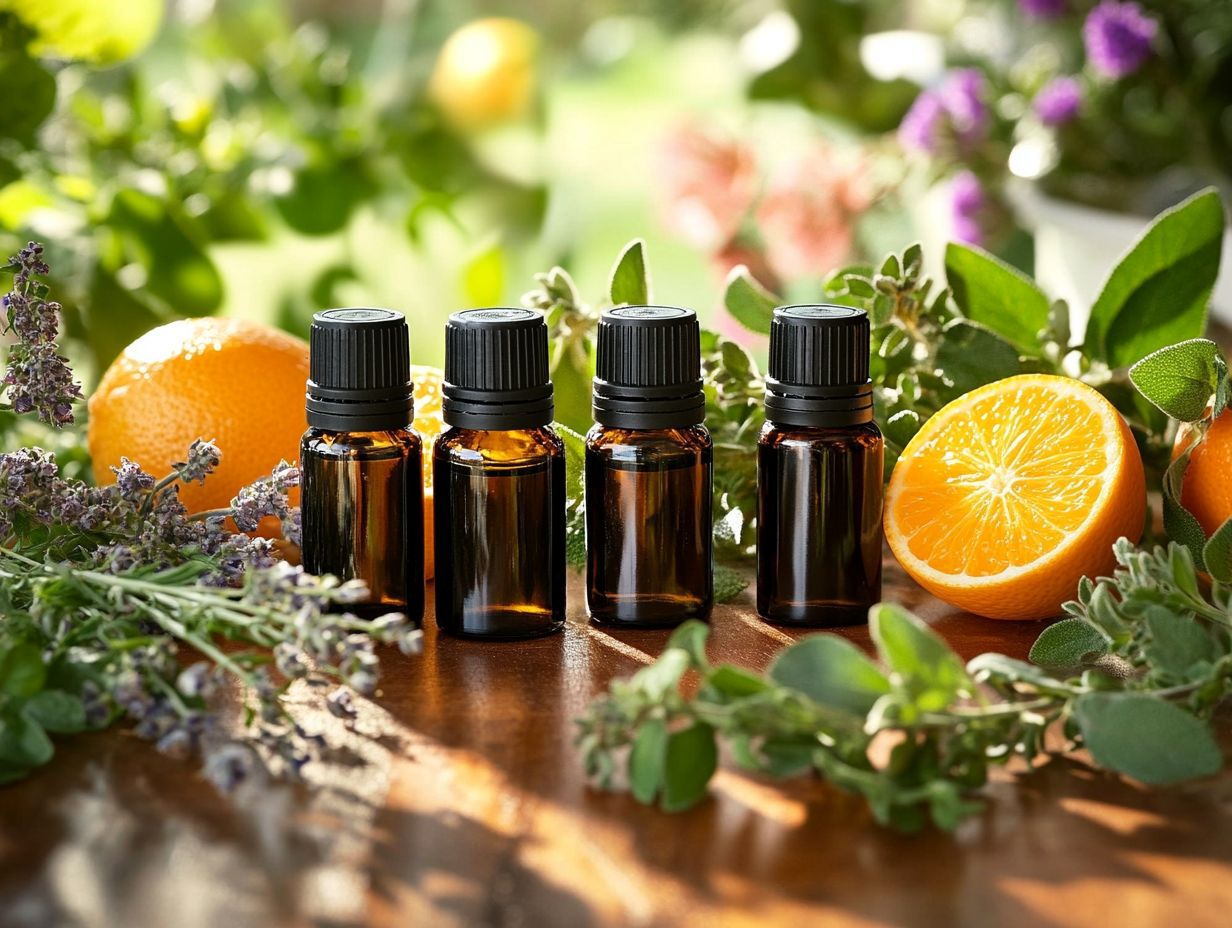
- Peppermint oil can help reduce inflammation and congestion caused by allergies.
- Lavender oil has calming properties that can soothe allergy symptoms and promote relaxation.
- Eucalyptus oil has antimicrobial and decongestant properties, making it effective in eliminating allergens at home.
- Tea Tree oil possesses powerful antimicrobial properties that can address mold and dust mites.
- Lemon oil is celebrated for its mood enhancement and respiratory system support.
1. Peppermint Oil for Digestive and Respiratory Support
Peppermint oil is a remarkable essential oil, renowned for its extensive benefits, especially when it comes to headache and stress relief. This powerful natural remedy can be an invaluable ally in addressing various health concerns. Its invigorating aroma and soothing properties not only help reduce inflammation but also provide immune support, making it a favored option for those who seek holistic solutions for everyday ailments.
You may find yourself reaching for peppermint oil when tension headaches strike. Simply inhaling its refreshing scent or applying a diluted solution to your temples can deliver swift relief. When stress levels rise, the uplifting aroma can transform your space into a serene haven, whether you use it in a diffuser or add it to a relaxing warm bath.
Moreover, peppermint oil is known to support the immune system. Topical applications, such as a massage blend combined with a carrier oil, can offer additional assistance during cold and flu seasons. Just remember to test for skin sensitivity before application and steer clear of sensitive areas like your eyes to ensure safe and effective use of this potent oil.
2. Lavender Oil
Lavender oil is renowned for its calming properties, making it a critical essential oil for enhancing sleep and uplifting your mood perfect for anyone navigating the challenges of stress or anxiety. This aromatic oil offers a wide range of applications in skincare and can be effectively utilized in various natural remedies to foster relaxation and overall wellness.
With its enchanting aroma, lavender oil is a staple in aromatherapy practices, celebrated for its remarkable ability to soothe both the mind and body. By inhaling its delightful scent or utilizing it in a diffuser, you can effortlessly create a tranquil atmosphere that encourages restful sleep and elevates your mood.
Regarding skincare, lavender oil shines with its anti-inflammatory and antiseptic properties, making it an excellent choice for treating minor skin irritations and blemishes. Many people find that incorporating lavender into their bedtime routine not only helps them drift off to sleep more quickly but also enhances the overall quality of their rest, cultivating a sense of peace that can significantly reduce anxiety levels throughout the day.
3. Eucalyptus Oil
Eucalyptus oil is a remarkably versatile essential oil, celebrated for its invigorating scent and impressive benefits. It supports your respiratory system and enhances immune function. With its potent anti-inflammatory properties, eucalyptus oil is a superb natural remedy for common ailments like colds, congestion, and seasonal allergies.
This oil is particularly valuable during cold and flu season. It soothes sore throats and clears nasal passages, making breathing easier. Its antimicrobial qualities bolster your immune system and help ward off infections.
If you re looking to incorporate natural remedies into your routine, eucalyptus oil is easy to use. You can apply it through steam inhalation or by diffusing it in your space. Simply add a few drops to a bowl of hot water for inhalation, and you’ll experience its therapeutic effects directly. This makes it an essential component of holistic health practices.
4. Tea Tree Oil for Skincare and Immune Support
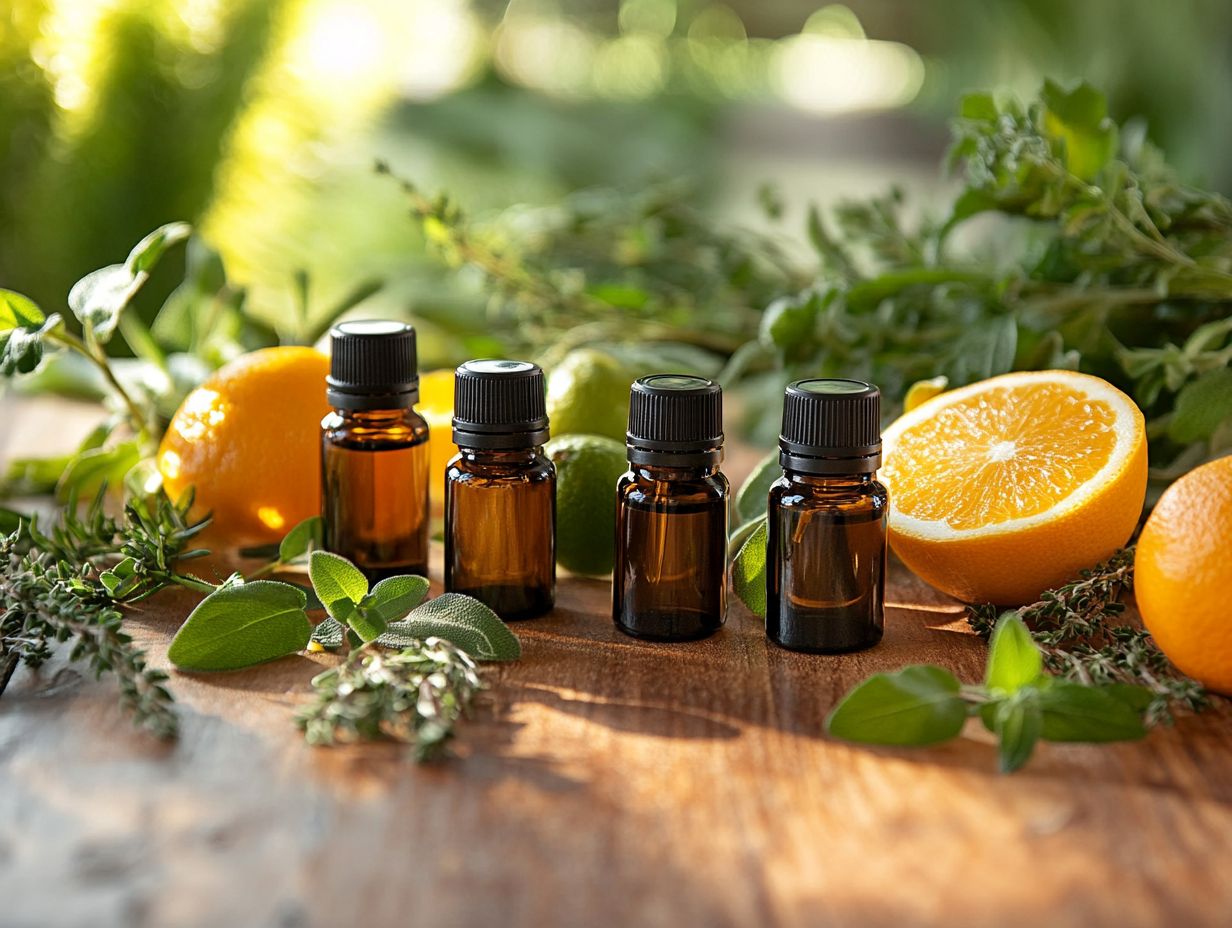
Tea tree oil is a superstar in the world of essential oils. It is renowned for its potent antimicrobial properties, making it a cornerstone in effective skincare routines for tackling acne and various skin conditions. Its benefits don’t stop there; this versatile oil also excels at reducing inflammation and supports your immune system.
What truly distinguishes tea tree oil is its remarkable ability to soothe irritated skin. It effectively targets the bacteria responsible for breakouts and flare-ups. If you’re dealing with acne, applying diluted tea tree oil can work wonders by minimizing redness and promoting healing. Its anti-inflammatory properties help reduce swelling and discomfort, giving you much-needed relief.
Start incorporating tea tree oil into your home remedies today for fantastic results! You can mix it with carrier oils these are base oils that dilute essential oils and help apply them to the skin safely for topical applications or use it in steam inhalation to combat congestion and clarify your skin. This dual functionality makes tea tree oil a must-have in any skincare arsenal.
5. Lemon Oil
Lemon oil is a refreshing essential oil known for its uplifting aroma and a plethora of health benefits. It enhances mood and supports digestion. This invigorating oil acts as a natural remedy for stress relief and is widely embraced in aromatherapy to create a positive and lively environment.
Lemon oil stimulates the mind, boosting focus and mental clarity. It’s an excellent choice if you’re feeling mentally fatigued. Its vibrant fragrance invigorates any space, elevating your mood and fostering a sense of happiness. Regarding digestion, this oil helps alleviate discomfort from bloating and indigestion while promoting a healthy gut balance.
You can use lemon oil in a diffuser, add it to a warm bath, or blend it with carrier oils for a soothing massage. By incorporating this natural remedy into your routine, you may discover an overall sense of well-being. Lemon oil is a truly valuable addition to any wellness regimen.
What Are Essential Oils and How Do They Work for Your Health?
Essential oils are concentrated plant extracts that elegantly capture the natural fragrance and beneficial properties of various botanicals. They offer a plethora of therapeutic benefits, enhancing your well-being through natural remedies and aromatherapy.
These oils have a positive impact on both the immune and respiratory systems. Essential oils can also aid in inflammation reduction, pain relief, and digestive support.
You can apply these oils through inhalation methods or mix them with a carrier oil such as coconut or jojoba for topical application, allowing you to customize your wellness experience.
Extracted using techniques like steam distillation and cold pressing, these oils retain the true essence of the plants from which they come. You can use this essence in various ways, from diffusing it into the air to crafting personalized blends for your skin or using it in warm baths.
When supporting your immune system, certain essential oils boast antimicrobial (these oils fight germs and help prevent infections) and antiviral properties, potentially bolstering your body’s defenses. Others can alleviate respiratory discomfort by serving as decongestants or soothing irritants.
Always remember to dilute essential oils with carrier oils like coconut or jojoba. This enhances absorption and helps prevent irritation, ensuring a safe and effective application tailored to your needs.
What Are the Benefits of Using Essential Oils for Allergies?
Using essential oils for allergies can provide you with significant relief thanks to their antihistamine properties and their ability to reduce inflammation. This effectively supports your immune system during allergy season. Oils like eucalyptus, tea tree, and basil can help alleviate symptoms associated with allergens, offering a natural remedy that works beautifully alongside traditional treatments.
Essential oils such as lavender, peppermint, and chamomile also possess natural anti-inflammatory properties, soothing irritated airways and reducing swelling to promote easier breathing. By incorporating these oils into your daily routine, you may experience fewer allergy-related symptoms, like sneezing and nasal congestion.
The calming effects of oils like chamomile can be particularly beneficial if you suffer from stress-related allergy flare-ups. This allows you to adopt a holistic approach to managing your allergies. By nurturing your body s immune responses, essential oils not only offer immediate symptom relief but also provide stress relief and contribute to your long-term wellness during those challenging allergy seasons.
Which Essential Oils Are Best for Allergies?
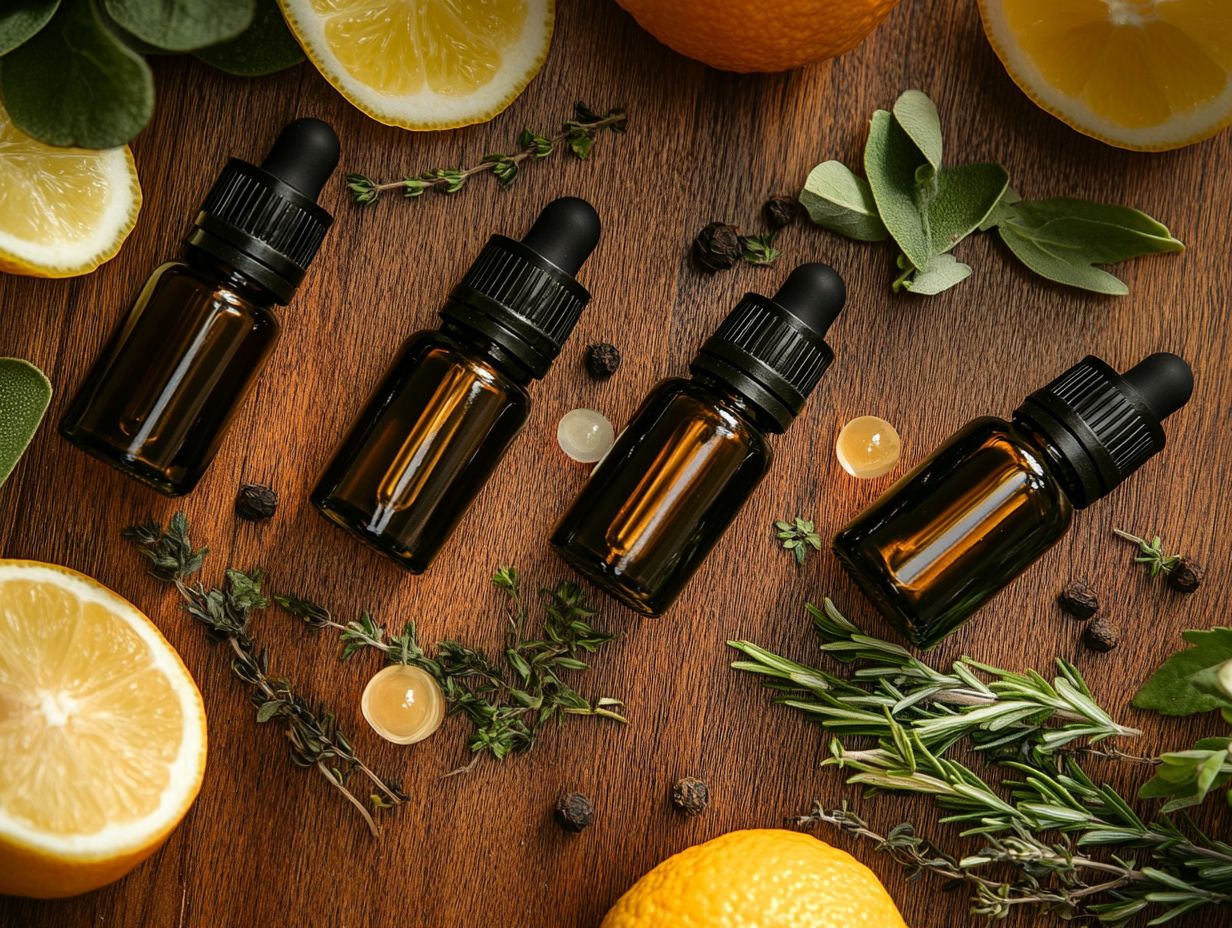
Several essential oils can be particularly effective in combating allergies. Standout options include peppermint oil, eucalyptus oil, tea tree oil, and lavender oil. Each of these oils possesses unique properties that help alleviate allergic reactions, providing relief from respiratory discomfort, inflammation, and other common symptoms associated with seasonal allergies.
Choosing the right oil is essential, as each one offers distinct advantages tailored to the type of allergy you re dealing with and your personal preferences. For instance, invigorating peppermint oil delivers a refreshing cooling sensation and can help open your airways, making it easier to breathe during those challenging seasonal allergies.
Eucalyptus oil is revered for its anti-inflammatory properties, soothing your respiratory tract and promoting clearer breathing. Meanwhile, tea tree oil, with its antimicrobial qualities, can assist in warding off infections that sometimes accompany allergic conditions. Don t overlook lavender oil, which not only provides calming effects but also helps reduce histamine responses, making it an excellent choice for nighttime relief.
Basil oil is known for its antihistamine properties and effectively reduces allergy symptoms. By understanding these specific benefits, you can make informed choices perfectly tailored to your unique allergy experiences. Incorporating these oils can also support your immune system and enhance your overall wellness.
How Can Essential Oils Be Used to Eliminate Allergens at Home?
Essential oils can serve as your secret weapon against allergens lurking in your home, offering various methods to create a healthier living space. By harnessing inhalation techniques and topical applications, you can turn to natural remedies that truly make a difference.
Incorporating oils like tea tree and eucalyptus into your cleaning routines or utilizing diffusers can drastically reduce airborne allergens. These practices elevate your indoor air quality to new heights! They can also support your immune system and respiratory health.
Not only do these aromatic compounds enhance the scent of your home, but they also cultivate a soothing atmosphere that promotes relaxation. Regular cleaning is crucial for maintaining an allergy-friendly home, and integrating essential oils into this regimen amplifies their incredible benefits. Essential oils like lavender and lemon also enhance your mood and improve overall wellness.
For example, adding just a few drops of lavender or lemon oil to your cleaning products can neutralize odors and effectively combat dust mites, mold, and mildew those pesky triggers for allergic reactions. Using these oils can also contribute to immune support and overall health improvement.
With a diffuser in your space, you can disperse these beneficial oils throughout every nook and cranny, ensuring your home remains fresh and free from allergens. In this way, your sanctuary becomes a true haven for all who inhabit it! Using these oils in a diffuser also promotes better sleep and reduces stress.
Are There Any Risks or Side Effects of Using Essential Oils for Allergies?
While essential oils offer a plethora of benefits for managing allergies, it’s essential to be mindful of the potential risks and side effects that may accompany their use, especially if you have sensitivities. Certain essential oils might lead to skin irritations or allergic reactions. Conducting a patch test and consulting with a healthcare professional before diving in is vital. This step is particularly important for those dealing with acute allergic rhinitis or other severe allergic conditions.
Improper application or overuse can exacerbate existing conditions or even trigger respiratory issues in those who are particularly vulnerable. It s wise to research specific essential oils and their properties, as some can be more irritating than others. Using a carrier oil a substance that dilutes essential oils to make them safer for skin application for topical applications can help mitigate these risks.
To minimize risks, always ensure proper dilution with a carrier oil and opt for suitable application methods, such as diffusing or inhalation, instead of applying them directly to your skin. This thoughtful approach enhances safety and boosts the efficacy of the oils. Methods like aromatherapy can also provide additional benefits such as headache relief and digestive support.
Try incorporating essential oils into your daily routine for a fresh start! Your health and well-being deserve it!
What Other Natural Methods Can Help Eliminate Allergens at Home?
You can use various natural remedies to eliminate allergens at home. These include regular cleaning, reducing dust mites, and controlling mold growth.
By incorporating air purifiers and maintaining a clean environment, you can significantly lower your exposure to environmental triggers. This creates a healthier living space.
Keeping surfaces immaculate and minimizing clutter are essential steps in this endeavor. Dust accumulation can intensify allergy symptoms.
Regularly vacuuming carpets and upholstery with a special vacuum filter that traps tiny particles will effectively trap allergens, ensuring they don t linger in your home. This is especially important for maintaining a hypoallergenic environment.
Maintaining dryness within your living spaces is crucial to prevent mold growth, which flourishes in humid conditions. Proper ventilation in areas like bathrooms and kitchens, combined with the use of dehumidifiers in damp areas, supports a serene and healthy environment.
Implementing these practices now will boost your respiratory health and enhance your overall wellness.
Together, these practices not only help you dramatically reduce allergens but also enhance the overall effectiveness of essential oils. This creates an aromatic and soothing atmosphere that you can truly enjoy.
The use of essential oils like frankincense can also provide additional inflammation reduction benefits, making your home a sanctuary of health and comfort.
Frequently Asked Questions

What are the 6 essential oils that can eliminate allergens at home?
The 6 essential oils that can eliminate allergens at home are eucalyptus, peppermint, lavender, tea tree, lemon, and basil.
How do eucalyptus essential oils help eliminate allergens?
Eucalyptus essential oil has antimicrobial properties that can kill mold, bacteria, and other allergens in the air. Its anti-inflammatory properties also help reduce respiratory inflammation.
Can peppermint essential oil reduce allergy symptoms?
Yes, peppermint essential oil has anti-inflammatory properties that can help ease allergy symptoms such as congestion and headaches. It also provides a cooling sensation that promotes easier breathing.
Can lavender essential oil be used to eliminate dust mites?
Yes, lavender essential oil has natural antihistamine properties that can prevent dust mites from thriving. This helps in reducing allergy symptoms. It can also enhance relaxation and improve sleep quality.
How can tea tree essential oil help with allergies?
Tea tree essential oil has antiseptic and anti-inflammatory properties that can reduce allergy symptoms and purify the air from allergens. It is also effective in skincare routines for alleviating allergic skin reactions.
Is lemon essential oil effective in eliminating pet dander?
Yes, lemon essential oil has high levels of limonene that can break down and neutralize pet dander. This makes it a powerful allergen eliminator. It also contributes to mood enhancement and improves the overall scent of your home.
Explore our essential oils and discover how they can enhance your living environment!

